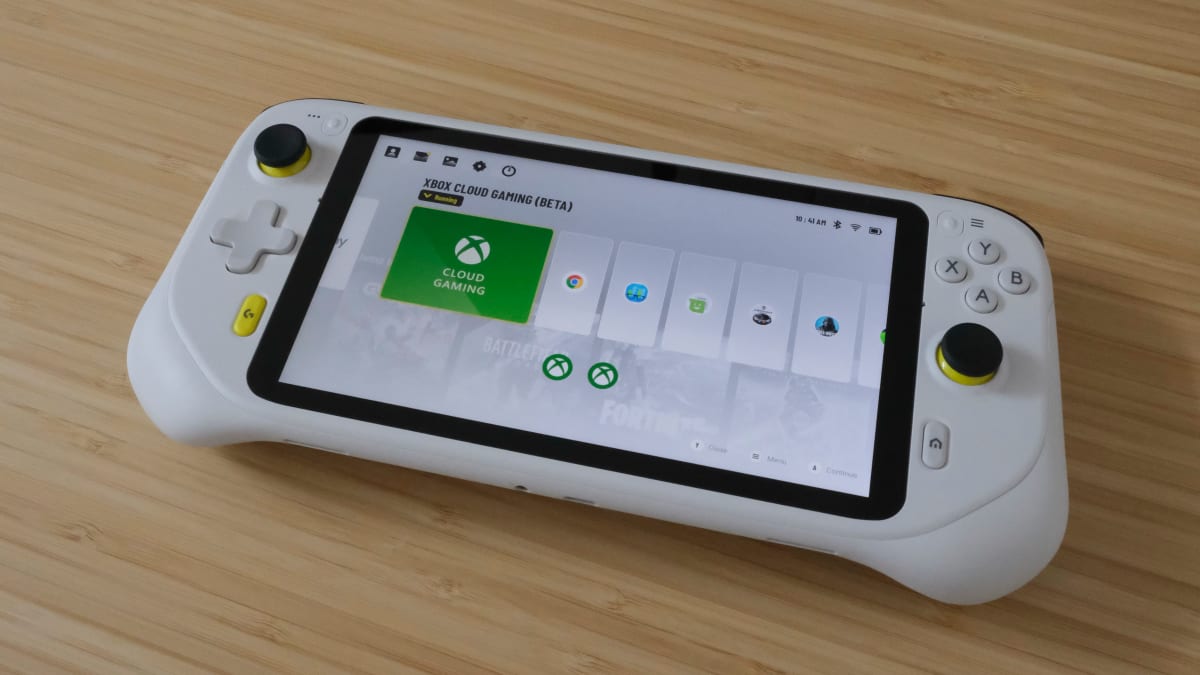
Logitech’s G Cloud handheld gaming device looks like a Nintendo Switch OLED or a Valve Steam Deck, sandwiching a display between controls, making it possible to game from anywhere. However, unlike the Switch or Steam Deck, the G Cloud was designed from the ground up to be used as a cloud gaming device--heck, Cloud is even in its name, making it clear what it’s made for.
For the last month I’ve been using the G Cloud to supplement my typical PC, Steam Deck and Xbox Series X gaming sessions. It’s become clear that Logitech’s (LOGI) G Cloud is a capable gaming device, but it’s not for everyone, thanks to a few caveats.
Let’s dig in, shall we?
The Arena Media Brands, LLC and respective content providers to this website may receive compensation for some links to products and services on this website.
A Near Perfect Portable Gaming Handheld Design
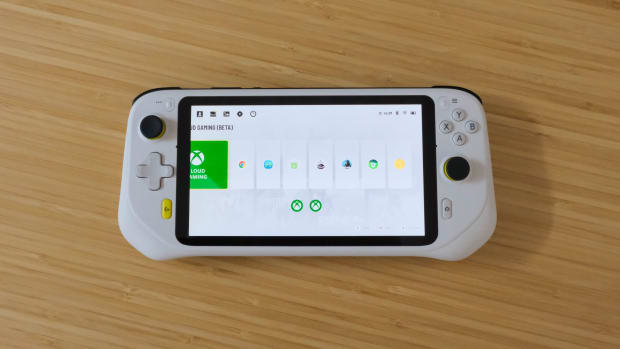
The Logitech G Cloud looks a lot like the white Nintendo Switch OLED. It has a 7-inch display in the middle of the housing, with a joystick, d-pad, and a couple of system buttons to the left of the screen. On the right side is another joystick, A/B/X/Y buttons, and a couple more system buttons. Unlike the Switch, the G Cloud lacks removable controllers … so don’t try to rip these out.
On the top of the housing you’ll find the standard L/R bumpers and triggers, a volume rocker and a power slider. There’s also a microSD card slot which can be used to supplement the internal 64GB of storage. On the bottom are a USB-C port for charging and data transfer along with a 3.5mm audio jack.
Each end of the housing has a familiar curvature to it, mimicking a dedicated gaming controller that fits nicely into the palm of each hand.
The G Cloud is slightly larger than the Switch OLED, measuring 4.61 x 10.11 x 1.3 inches, compared to the Switch’s measurements of 4 x 9.5 x 0.55 inches (with controllers attached). That also means it weighs more, coming in at 1.2 lbs. versus the Switch’s 0.93 lbs. (again, with controllers attached).
Both devices are very comfortable to use and hold for long periods, but I’m inclined to prefer the design of the G Cloud because it’s more ergonomic to hold. The all-flat design of the Switch does lead to occasional cramps in hands after extended gaming sessions.
For reference, Valve’s Steam Deck dwarfs both portable gaming devices. It measures a whopping 4.6 x 11.7 x 2 inches and weighs 1.48 lbs. All things considered, the Steam Deck is balanced and ergonomic–but I still prefer the design of the G Cloud over it.
The screen is touch-capable, and I haven’t seen any issues with input lag or speed. It has a resolution of 1920 x 1080 with a 60Hz refresh rate and 450 nits peak brightness. There’s nothing overly special about the screen and its quality; it’s a 1080p HD display that has sharp colors that makes the games look great. I didn’t have any issues with the screen not being bright enough but didn’t test it outside in direct sunlight. Because it’s winter. And cold.
One nitpick about the design of the G Cloud is the placement of the A/B/X/Y buttons. They’re simply too close to the right joystick and I would often accidentally hit a button as I pushed the joystick all the way forward.
Other than that, Nintendo and Valve could learn a thing or two from the G Cloud’s design.
The G Cloud is an Android Tablet at its Core
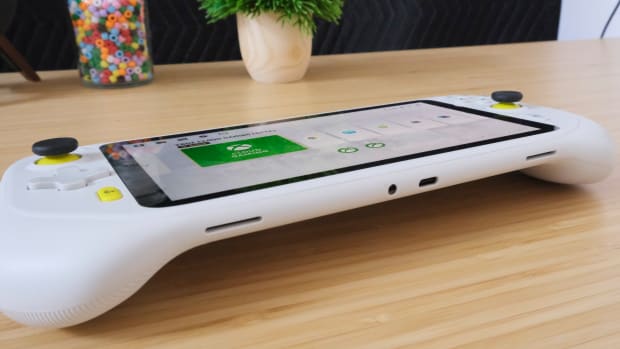
Now that we know what’s on the outside of the G Cloud, what about the inside? You may be surprised to learn that the G Cloud runs Android--yes, the same operating system found on countless smartphones and tablets. More specifically, the G Cloud currently runs Android 11.
That means you have full access to all of the standard Android apps like Chrome, Gmail, Maps, Drive and even the Play Store, where you can download third-party apps and games.
In fact, you can leave Logtiech’s G Cloud gaming handheld mode and convert the interface into a more traditional Android tablet interface if you’d like.
The G Cloud is even powered by Qualcomm’s Snapdragon 720G processor; a mid-range processor designed for smartphones that were first released in 2020. And, no, the G Cloud doesn’t have any sort of cellular connectivity. It’s strictly Wi-Fi, and Wi-Fi 5 at that, which is a disappointment as Wi-Fi 6 and Wi-Fi 6E are becoming more commonplace and offer a better overall experience.
There’s 64GB of internal storage, and you can add more space using the microSD card slot on the top of the handheld. The 720G processor offers 4GB of RAM, which was more than enough in my testing
Logitech touts “12+” hours of battery life, and I can confirm that’s a realistic estimate. I’ve been more than impressed with the battery life of the G Cloud, both for long gaming sessions and when leaving it sit idle for a few days--the battery life is legit.
So, What’s it Like to Game on? Well, it Depends
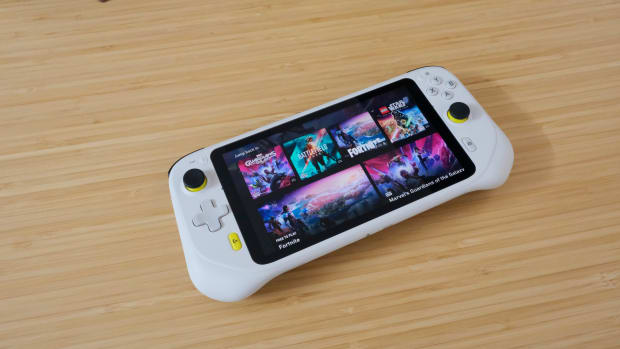
Enough about the design and operating system--what’s it like to use the G Cloud as a gaming handheld? The answer is complicated, because it depends on what (if any) cloud gaming services you subscribe to.
The G Cloud currently supports Xbox Game Pass and Nvidia GeForce Now for cloud gaming, and Xbox Remote Play and Steam Link for remotely playing games on your home’s Wi-Fi network.
Additionally, you can always download games designed for Android phones and tablets via the Play Store. There’s a major problem with going this route, though. Not all games will recognize the controller that’s built into the G Cloud, thus requiring you to use the touchscreen controls. That’s the case with Call of Duty Mobile, and it’s not a fun experience to reach across the controller to the screen to play. It’s uncomfortable, awkward and just not ideal.
I’ve seen videos of people playing the popular mobile racing game Asphalt 9 on the G Cloud, but for whatever reason, I can’t get it to load past the title screen. There’s an error message that pops up saying I don’t have a reliable network connection (I do) and the issue persists.
All of that to say: Don’t buy the G Cloud thinking it’ll be a reliable or even fun Android gaming device. You’re better off playing mobile games on your smartphone.
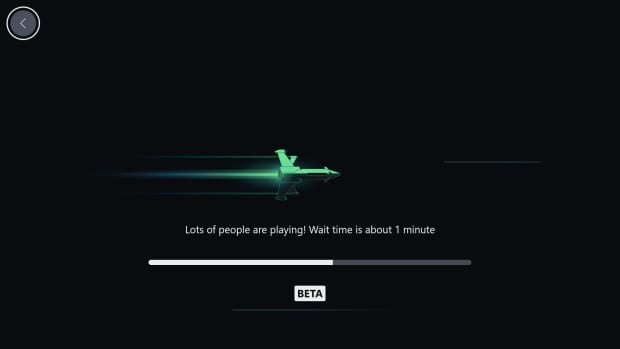
As for cloud and remote play gaming, the experience is much better. I don’t have a subscription to Nvidia GeForce Now, but I do have an Xbox Game Pass subscription that allows me to use Microsoft’s cloud gaming platform.
Upon launching the Xbox Cloud Gaming (Beta) app, you’re asked to sign into your Microsoft account. Once signed in, you gain access to roughly 200 different titles. Games range from Fortnite (which you can play for free, even without a Game Pass subscription) or Among Us to titles like Assassins Creed Odyssey or older titles like the original Doom.
I’ve spent most of my time testing the G Cloud playing Battlefield 2042, Guardians of the Galaxy, Lego Star Wars The Skywalker Saga and Forza Horizons. What I’ve discovered during my time testing, and it’s probably obvious to most, but cloud gaming isn’t designed for games like Fortnite or Battlefield. Games where you’re playing against other people and having real time control and responses can make the difference between winning or losing.
I often felt like I was a half second behind other players in Fortnite and Battlefield. By the time I was ready to aim and start shooting, I was dead or, at the very least, severely hurt. It made playing those games not fun, and I play games to have fun.
However, playing single player games where you’re following a story, racing or fighting against bad guys in the game, then the cloud gaming experience is amazing. It’s where the G Cloud really shines.
When you start playing one of the games available in Xbox Cloud, the entire experience is streamed directly to the G Cloud. That means you don’t have to wait for the game to download and install, or wait for a pending update to complete. All of the games are available on demand. It’s awesome, when it works.
I have Eero’s Pro 6E mesh wi-fi network with a 1.2Gbps connection, and I still experienced performance issues, presumably due to wi-fi throughput, with the game fully loading and rendering properly--even on single-player games. Here are a few screenshots showing how pixelated the games would get at times.
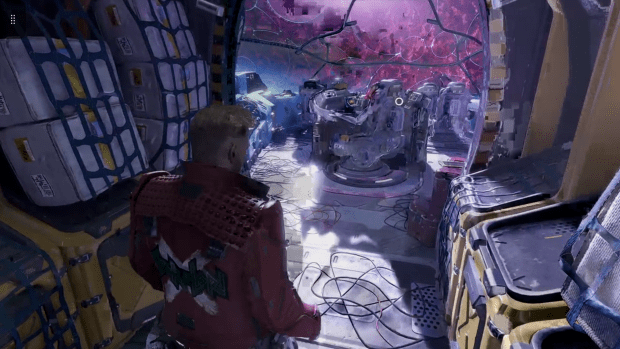
I did spend a bit of time using the Xbox’s Remote Play feature that essentially streams an active gaming session on your Xbox to the G Cloud over your home’s network. Instead of relying on a server in the cloud, you’re using your Xbox. The experience was better, and I could even play Call of Duty’s Warzone 2, but as was the case when playing Fortnite via the cloud, I often felt like I was just a tad behind the other players and the end result was losing match after match.
I even experimented a bit with Steam Link and playing God of War on the G Cloud, streaming it directly from my Gaming PC and that worked better than streaming from my Xbox, but I think that’s partly because I was playing a single-player game, following the storyline.
Do you pick up on a theme here? I do.
The G Cloud delivers as a gaming handheld for cloud gaming, but don’t expect to compete match in and match out at fast-paced games like Fortnite. Instead, it’s better suited for single-player games that are more forgiving for lag or millisecond delays in reactions.
Is the Logitech G Cloud Worth it?

The G Cloud isn’t for everyone. It doesn’t make sense to buy it to use as an Android gaming device. Furthermore, you’ll need to have a subscription to one of the support services, such as Xbox Game Pass or Nvidia GeForce--bringing a monthly cost to the portable gaming handheld.
But for someone who is looking to extend their Xbox’s gaming range throughout the rest of their home, or even anywhere they have a strong Wi-Fi network, then the G Cloud is the ideal Xbox accessory.
Just don’t pay the full $350 asking price. Thankfully, Logitech and Amazon are both currently discounting it to $299.99. It’s a better price to pay.
Prices are accurate and items in stock at time of publishing.







